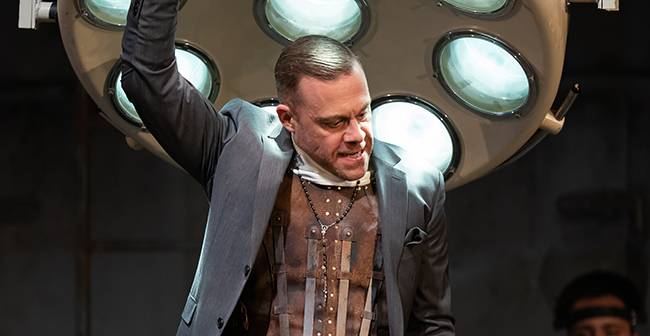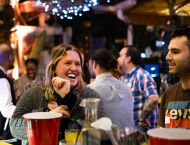Music
 Photo: Courtesy of Shakespeare Theatre Company
Photo: Courtesy of Shakespeare Theatre Company
Inside Richard the Third’s Doom Rock Inspired Soundtrack
March 7, 2019 @ 12:00am
Shakespeare and doom rock are not two things one would associate. But in the world of Shakespeare Theatre Company‘s Richard the Third the two are intrinsically linked, thanks to composer Lindsay Jones. A lifelong lover of music, Jones has been playing since he was a teen and is entirely self taught. While working as an actor in Chicago, he began scoring plays as a side gig. Combined with his passion for music, it quickly became a legitimate career that’s seen him score a host of successful productions throughout the country. Now, 25 years into his career crafting innovative compositions for theatre, Jones lent his talent – and love for doom rock, punk and metal – to the score of STC’s dark performance.
OT: How did you come to work with Shakespeare Theatre Company on this play?
Lindsay Jones: When I first sat down with [artistic director] David Muse, he told me he wanted [the score] to be punk rock. I’ll be honest, I’m a huge fan of punk rock, but I never get asked to make punk rock. There just aren’t a lot of theatres in America looking for punk rock soundtracks. As he described it to me, he said he wanted it to start out very punk and full of energy, but as the play went on, to get distorted and ugly and dirty.
OT: How did you or the others involved in the play decide to approach the score using doom rock?
LJ: I started thinking of using doom rock, which is slow, and dirge-y but still super distorted – the soundtrack of your nightmares, basically. I wanted to start with punk rock [that became] doom rock as it went along. But it occurred to me that in the structure of Richard the Third, in the beginning of the play Richard says, “I’m planning this takeover, I’m going to slowly methodically knock out all of my enemies til’ I get to be king.” There’s not a lot of fast stuff in there. Once Richard is king, everything starts falling apart and becoming more frantic and crazy. Halfway through I realized I was doing this in reverse – it should start slower and speed up as it goes, so that’s what we did.
OT: What other elements played into the score’s composition?|
LJ: As I was walking out of David’s office after our initial meeting, he told me he had this other idea for the actors to be playing body percussion along with the music. I didn’t know how that was going to play itself out. They hired an amazing movement choreographer named Stephanie Paul, who in rehearsal worked with the actors to create complex sequences where they’re playing on their bodies with knives and sticks – all sorts of things. They’re pounding out complicated rhythms while sequences are happening. So I would watch videos of the actors doing these movement sequences, figure out what the BPM was and then create music that fit.
OT: That’s an incredibly unique element – and incredibly challenging to work with, I can imagine!
LJ: Rock music doesn’t usually have a lot of space for additional percussion. The whole idea is it’s super loud and regressive. The first challenge was just fitting everything in. We ended up [putting microphones on] the stage and performers, so I could pick up [the percussion] and amplify it to the same volume level as the recorded music.
The other challenge, which probably took us the longest time to sort out, is that these actors worked for several weeks creating percussion sequences and got pretty good at it, but they weren’t initially trying to perform these sequences along to anything else [like music]. As soon as I show up with recorded music at a certain tempo every time no matter what – it was a lot of telling them to start at a certain beat, keep up with a certain rhythm, listen to parts of the score – so they could hear the rhythm they have to keep up with.
So we’re telling them “okay actors, you’re going to speak, you’re going to play rhythm on your body and you’re going to attempt to stay completely in time with this recorded piece of music that’s playing along.” I have to give the cast a tremendous amount of credit. It was tricky but they hung in there, and wanted to make it work. When you see the performance now, it all seems like second nature. But at the time of putting it together, we definitely had moments of thinking “oh my god, what have we done?”
OT: How have your audiences received the score?
LJ: People who are casual theatre fans are really excited by it. The reviews have either said “wow, this is a totally crazy interpretation of this play and I really enjoyed it” or “oh my god, what did they do, I don’t know how I feel about it!”
One of the reviews called the score “post-Wayne’s World,” so if your relationship to hard rock music is Wayne’s World, I don’t know if there’s much I can do to help you.
OT: Scoring any play, but especially a Shakespeare classic like Richard the Third, is no small task. Why do you think this job is so important, and what keeps you in this industry?
LJ: I’ve started teaching how to write theatre compositions recently and one of the things I like to tell my students is that music is really the emotional context by which you’re going to receive drama. This speech I’m giving right now about how music affects – you could imagine that while I’m giving it there’s a slow building underscore that’s really inspirational and exciting. That’s going to totally frame the context by which you’re getting this information. If I gave the same speech with dark scar music, it completely changes the context by which you see it because now you’re imagining something terrible is going to happen.
Music is incredibly powerful and influential. When you’re given the responsibility of creating music that’s going to match live drama, you really have a great responsibility to try to make the music as close to what the action is as possible, so that the audience is receiving the clearest and most expressive form of the story.
Shakespeare Theatre Company’s Richard the Third runs through Sunday, March 10 at Shakespeare Theatre Company’s Sidney Harman Hall. Tickets $44-$102. For more on composer Lindsay Jones, visit www.linsdayjones.com. You can find the punk, metal and doom rock songs that inspired Jones’ compositions below.
Sidney Harman Hall: 610 F St. NW, DC; 202-547-1122; www.shakespearetheatre.org
Richard the Third – tracks and influences
Influence – Black Sabbath by Black Sabbath
Influence – Boilermaker by The Jesus Lizard
Influence: Bliss In Concrete by Pelican
Influence: Otsegolectric by Static-X







